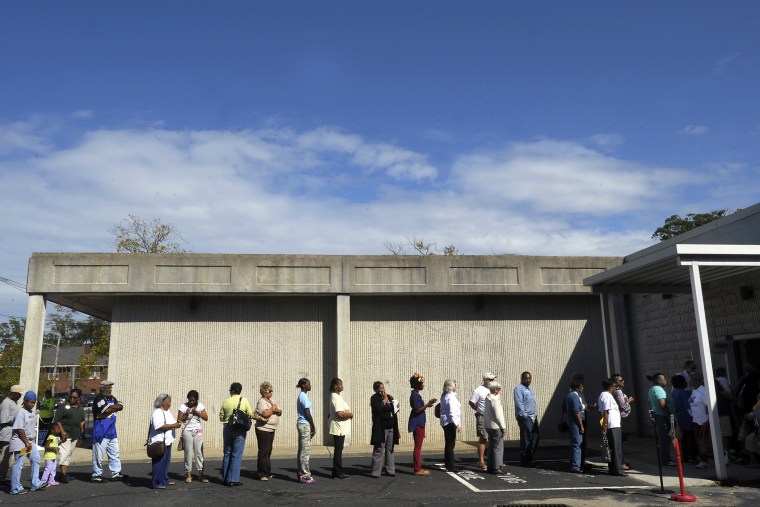In late July, the 4th Circuit Court of Appeals issued one of the year's most important voting-rights rulings, striking down the heart of North Carolina's aggressive voting restrictions. The Republican-imposed limits, the appellate court found, targeted African-American voters "with almost surgical precision."
"We recognize that elections have consequences," the decision read, "but winning an election does not empower anyone in any party to engage in purposeful racial discrimination." The ruling added that GOP lawmakers in the state specifically sought data on racial breakdowns in early voting, then eliminated those days most likely to be used by African Americans.
North Carolina Republicans, however, imposed these voting restrictions for a reason, and quickly turned to the U.S. Supreme Court, asking that the justices reverse the 4th Circuit and reinstate the voting hurdles ahead of this year's elections. As The Nation's Ari Berman reported, that didn't turn out well for Gov. Pat McCrory (R) and the GOP-led legislature.
[Wednesday] the Supreme Court declined to reinstate three key voting restrictions that had been appealed by North Carolina -- the state's voter-ID law, cutbacks to early voting and elimination of preregistration for 16- and-17-year-olds. The Court deadlocked 4-4, which upholds the Fourth Circuit ruling. The death of Justice Scalia left conservatives short of the five votes they needed -- Justice Thomas would've reinstated all of the restrictions, while Justices Roberts, Kennedy, and Alito would've reinstated everything except the elimination of preregistration. This is a huge victory for North Carolina voters and will make it easier for hundreds of thousands to cast a ballot this November.
Given the electoral circumstances, that's no small development: North Carolina is considered a key presidential battleground in 2016, and the state will also host closely watched U.S. Senate and gubernatorial races this year.
Of course, while the outcome was heartening for voting-rights advocates, the fact that the high court was divided at all is a reminder of just how far to the right the Court's four-member conservative block really is. As Rick Hasen, an election-law expert at UC Irvine, explained yesterday, "The fact that this petition got four votes should be very depressing to those who have been hoping that perhaps Justice Kennedy and the Chief Justice would have had a change of heart on voter ID laws."
The justices' official order is online here (pdf).
As for the road ahead, there are a variety of other legal disputes still underway over voting rights -- yesterday's Supreme Court order was not a ruling, per se, and does not affect cases in other states -- and even the fight in North Carolina continues.
Berman's report in The Nation added, "GOP election commissioners are continuing to brazenly cut early-voting days and hours in local counties. The executive director of the North Carolina Republican Party, Dallas Woodhouse, urged Republican-controlled election boards to 'make party line changes to early voting' by adopting fewer early-voting days and prohibiting Sunday voting, when black churches hold 'Souls to the Polls' mobilization drives, and polling places on college campuses."
